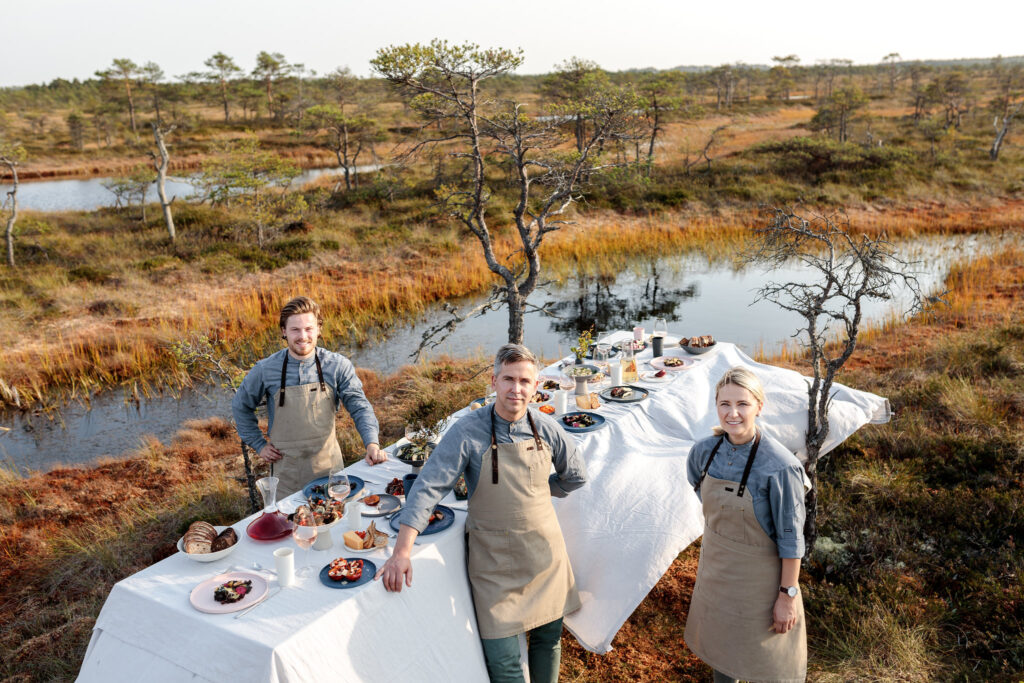Tips for Green Meetings
With demand for eco-friendly, or at least eco-friendlier, conferences on the rise, more and more meeting organisers are looking for green solutions. Putting together a sustainable conference will always require planning and work, but certain destinations like Estonia have some huge natural advantages that make the job a lot easier. Please see our list of top tips that can be applied in Estonia and elsewhere.
Accommodation & Venue Selection
- Choose Green Key-certified hotels and venues
When possible, choose hotels and venues that carry the international Green Key certification for environmental responsibility and sustainable operation. These facilities can guarantee compatibility with the sustainability approach of your event. Estonia has a number of Green Key-certified accommodation facilities and venues to choose from. Find Estonia’s Green Key-certified hotels at our Venue Finder Service
- Choose hotels in close proximity to your venue
You can reduce the ecological footprint of your event – as well as promote a healthy lifestyle – by choosing hotels located within walking distance of your meeting venue. As a back-up option, pick hotels that have easy access to public transport.
- Pick venues with strong, pro-environment policies
When shopping for venues, look for the ones that have a responsible attitude towards the environment and clear sustainability policies. These will guarantee that your event will have the smallest ecological impact by focusing on areas like energy efficiency, waste management and use of materials. A number of pro-sustainability suppliers operate in Estonia, check out our Venue Finder Service.
Transportation
- Encourage delegates to travel green
Encourage your delegates to select their travel companies and transportation options carefully, giving preference to companies that take green or sustainable approaches.
- Help participants find sustainable transportation options
Estonia offers affordable, easy-to-use public transport systems as well as great options for bike rental. You can encourage use of these eco-friendly alternatives by providing clear, detailed instructions, timetables and contacts. Similarly, you can provide information about shuttle buses, car sharing and taxi companies that use electric cars.
- Monitor your passenger numbers to avoid over-ordering
Why book a full-sized coach when a small van will do? To properly match your vehicle to your group size, keep an eye on the number of delegates in need of transportation at each stage of the event.
Food & Beverage
- Find the right partners
Select local caterers and suppliers who follow a sustainability approach. They will have the best overview of the market availability of the relevant products.
- Keep it local, organic and fair-trade
Work with your partners to choose products that are fair-trade or that are locally-produced. Select healthy and seasonal regional food. A wide variety of local products and ingredients can be found in Estonia for every preference and purpose.
- Provide tap water and skip the bottled
Supplying jugs of tap water is an excellent way to avoid the waste associated with bottled water. If bottled water is absolutely necessary, use glass bottles instead of plastic. Avoid disposable cups and cutlery, instead prefer biodegradable and recycled necessities.
- Reduce food waste
In order to minimise food waste, accurately calculate your attendance number and inform the caterers a few days prior to the event. If you still end up with excess food, arrange a donation to a local charity such as the Estonian Food Bank.
- Avoid small packages
Have your food and beverage suppliers use bulk packages and reusable dispensers for water, sugar, salt, pepper, cream and other condiments.
Information & Materials
- Go high tech and paper free
A great way to eliminate or drastically reduce the use of paper before and during your event is to move your activity online. Invitations, registration and follow-up procedures can easily be carried out via the internet, particularly in Estonia, a country famous for its love of high-tech solutions. Presenters and delegates can exchange event materials via online tools such as Dropbox and other cloud services. In addition to being environmentally friendly, the online approach will also save you time and money.
- Be smart about printing
If printing is absolutely necessary, use recycled paper or eco-friendly paper. Make sure that printing is done double-sided and that text is optimally formatted to eliminate excess pages.
- Use recycled material
Use necessities made of recycled material. Eco Pens and recycled paper are good examples. You can replace plastic name tags with ones made from recycled cardboard and ribbons. If you do end up using plastic name tags, ask participants to leave them in a box after the event for reuse at future meetings.
- Reuse and minimise the amount of promotional material
Promotional material such as banners, posters, etc., can be used several times if the information hasn’t changed. Additionally, smaller promotional items can be made available online.
- Use local producers
Select local producers and suppliers for giveaways and other necessities.
- Avoid high-impact gift giveaways
Handing out gifts to delegates is a fairly common practice but often generates waste and excess packaging. You can reduce the impact by organising exchanges of (unwrapped) gifts between participants. If giveaway gifts are a must, then give something that has a practical use or is made from recyclable materials and use products from local suppliers.
Energy & Waste
- Work with your venue
Cooperate with your venue to ensure that lights, equipment and air conditioning are switched off when not in use.
- Choose your equipment wisely
Use energy-efficient equipment whenever possible. Remember: more up-to-date equipment is usually more efficient as well. Encourage your venue to use energy-saving light bulbs such as LEDs or similar alternatives.
- Use natural light to save energy
minimise energy consumption by finding a venue where natural light can be used in meetings and be sure to use it as much as possible.
- Recycle and sort waste
Encourage participants and partners to recycle and sort waste. You can help them by arranging for multi-compartment recycling bins to be provided at the venue site. Collect any leftover paper from the event and use it later in your office.
- Use local, natural and reusable décor
When choosing your event décor, try as much as possible to use decorations from previous events. Use reusable or biodegradable material such as wood, plants and the like. If flower arrangements are needed, use locally-grown plants as well as local florists.
Green Policies
- Set out your sustainability approach
In the early stages of planning your event, decide on your sustainability approach and set it out briefly and clearly in a written, oral or audio-visual form that can easily be shared with all suppliers, partners, delegates and speakers involved.
- Encourage others and spread the word
Motivate and raise awareness about the importance of your sustainability approach among your staff and partners. Encourage them to share and spread the concept.
- Request sustainable services
When communicating with potential service providers, make sure they understand your commitment to sustainability. Ask them to outline their own sustainability approaches and programmes in their proposals.
Social Activities & Programmes
- Organise green-themed social programmes
Because Estonia is filled with stunning nature areas, it offers a wide variety of green-oriented activities. These include trips through wild bogs, canoeing in a national park, treasure hunts in the coastal village of Käsmu, learning about organic farming and much more. Taking part in these kinds of green social programmes will allow delegates to experience Estonia’s unforgettable wilderness while having a minimal impact on the environment. See our Activities page for more programme ideas.
- Encourage open-air activities
Estonia is an excellent place for activities that let delegates escape the stresses of high-speed city life. As much as 50% of the land is covered by forest and, according to the World Health Organization, the country rates 5th-best in the world for air cleanliness.
- Raise awareness through hands-on action
One of Estonia’s most successful international exports is a project called “Teeme ära!” (Let’s do it!), a social event where tens of thousands of volunteers turn up on the same day to clean areas of cities. Now a worldwide phenomenon, the campaign has gone a long way to raise awareness about sustainability. Similarly, event planners can strengthen their delegates’ environmental mindedness, as well as make their events more sustainable, by organising social events where participants clean up an urban area, plant trees, or help a local community or institution, etc.
Related Articles:

Marketing Manager
Posted: 05.08.2019
Categories: Green Meetings | Blog | Destination


